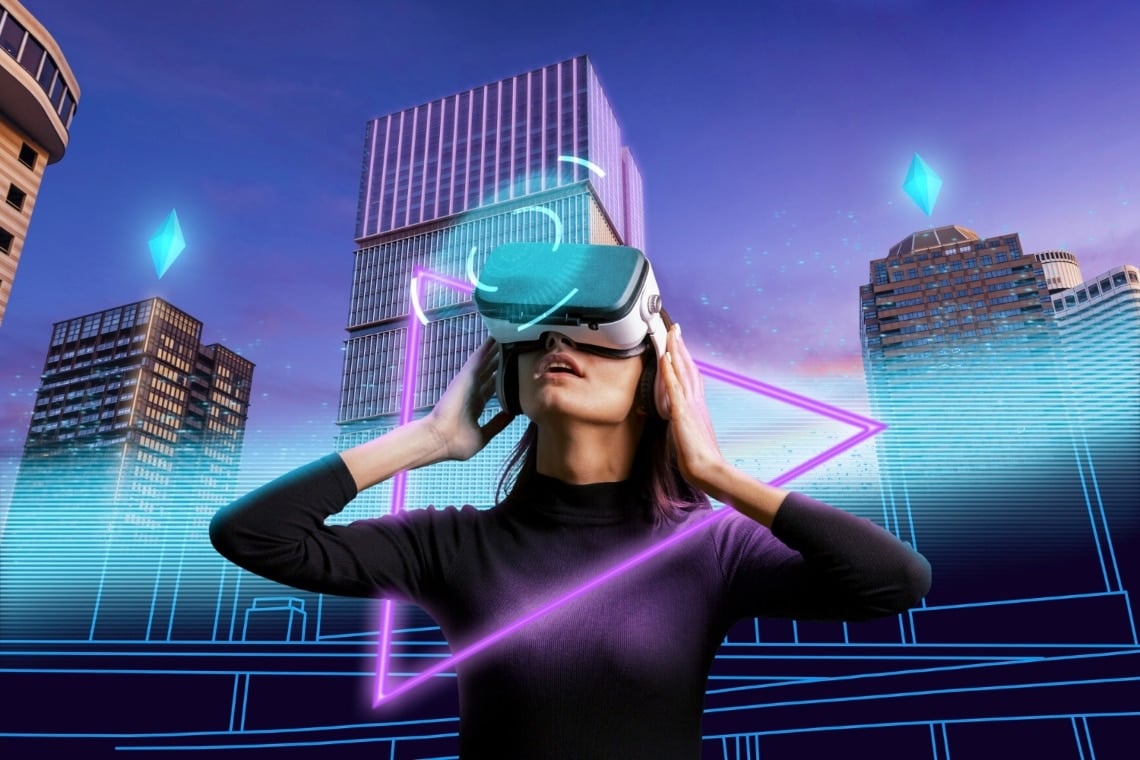The metaverse, also called Meta, is a virtual reality where people interact through avatars and can lead a completely digital life. The metaverse is envisioned and proposed by Mark Zuckerberg, who identifies it as the Internet of the future.
It was 28 October 2021 when Zuckerberg announced that Facebook would change its name to “Meta,” a key date for the future of shared virtual reality.
In the metaverse envisioned by the Facebook creator, users will be able to do anything they can imagine: keep in touch with friends and family, work, learn, play games, shop, and even indulge in new forms of creativity. That was Zuckerberg’s premise in introducing his new virtual Meta space.
Specifically, there will be the possibility to follow events held thousands of miles away in real time; computers and phones will be used in a completely different way than they are used today, because users will be able to enjoy innovative and immersive experiences thanks to VR/AR devices; companies will be able to set up virtual offices in which to hold meetings, seminars or gatherings; there will be the opportunity to attend classes or courses taught by the world’s best professors while staying at home; and so on.
But let’s proceed in order and analyze some of the most important new features of Meta that have surfaced recently.
Summary
Online shopping in Meta’s virtual reality
Meta has produced a new sensor that can improve many aspects in virtual reality, including online shopping. In fact, the new visor produced by Meta has five outward-facing and five inward-facing sensors needed to make the experience immersive.
It costs nearly 1,800 euros and will be available from 25 October. Meanwhile, Mark Zuckerberg’s company aims to change its e-commerce strategy. Meta has, for the first time, fine-tuned the assets to be used specifically in the Metaverse.
The innovation in question is the Meta Quest Pro, the first visor for whose use no additional device, PC or smartphone, is required. Specifically, it will be available in Italy from 25 October.
The new sensor enables 50% higher performance than the previous Quest 2 model. It also has much larger memories, with 12 GB of RAM and 256 GB of storage space.
All this will greatly affect many aspects of daily life, including online shopping. Which, in order to adapt and survive, is considering the possible best solutions to make the physical experience in the store and the digital experience integrated into one.
In fact, the fashion industry has already begun this transition to the metaverse successfully.
Gucci sold one of its bags on Roblox for significantly more than boutique value. Louis Vuitton celebrated the 200th anniversary of the founder’s birth with a full virtual reality experience, with quizzes and games to mark the occasion. And brands such as Dior are also investing in such experiences.
Education, training and healthcare in the Metaverse
Meta’s goal is to connect people to new experiences, in education and training, but also in the workplace and health care. The metaverse wants to revolutionize learning and discovery.
People will no longer be forced to passively learn information, they can be always and directly in the field, immersed in totally new experiences within 3D spaces.
For example, within the healthcare sector, the first steps are already being taken to innovate. Thanks to Meta and virtual reality, a surgeon will be able to do all the necessary practice before confronting a real patient.
Meta applied to physician training will make it possible to create realistic simulations for anyone who needs to learn the profession. So, there will be a depth view of organs, even from angles not normally allowed, and the ability to experiment without harming the patient.
To learn these new techniques and fully understand the potential of virtual reality, Meta has announced a partnership with French digital transformation company Simplon.co.
The aim is to create the first academies focused on this virtual world in four major cities in France, with the goal of training young people in the new professions of the future.
The free courses will focus on two professions in particular: designer-developer in immersive and metaverse technologies and support and service technician. In this first pilot project, there will be about twenty students per center who will start with a 3-6 month intensive individual training course.
Consulting and Meta: hiring in virtual reality
Mc Engineering, a Turin-based consulting firm specializing in engineering and information technology, is the first to hire in the virtual world.
Candidates will have the opportunity to participate in the selection interview with their avatar, during the meeting the company will be able to view the digital resume and fill out the candidate evaluation form using a virtual pc.
Candidates who want to join the company will be able to be interviewed directly from home with special visors through which they will enter the virtual spaces that Mc Engineering has created.
The same company has designed the Mc Engineering offices in the virtual world, starting with the entrance in which people are welcomed by the Vitruvian man, the symbolic image of the company, and continuing with the common spaces in which to receive information and advice, the auditorium intended for meetings, conferences and training moments.
Last but not least, the “interview room” inside which candidates can enter with a dedicated code and participate in the selection interview with their avatar. During the meeting, thanks to entirely new studies and techniques, the company’s human resources can view the digital resume and fill out the candidate’s evaluation form using the virtual pc mentioned before.
Nokia: “The metaverse will replace smartphones”
Nokia, one of the first companies to produce a consumer-grade mobile phone system, has claimed that Meta and the virtual reality attached to it could cause the end of smartphones.
This is because the Meta technology, as previously anticipated, involves experiences that will be powered by the use of virtual reality (VR) viewers and augmented reality glasses and will allow users to interact in various activities, a factor that could make smartphones, PCs and so on seem almost “ancient” tools.
So, while phones will still be around, metaverse experiences will be the main form of communication in the second half of the decade, according to Nokia.
Although augmented reality devices still have a long way to go, Nokia believes there will be an increase in public interest in such devices, which will fuel this push for the metaverse.
Meta and virtual reality are pushing for the metaverse to become a trend and common usage, a key factor in the entry of this new world. Consumers are not concerned about institutions, according to Nokia, but more about the cost of Meta products.
Indeed, Metaverse headsets have increased recently, from the base to the $400 stated in July by Meta, as has the premium option, Quest Pro VR, which is priced at $1,500. According to Nokia, this may be one of the real obstacles Meta will face.
However, industrial adoption will be easier to achieve, as some use cases are already being studied. Nokia anticipates that all this connectivity will create security holes, and the company is already working to protect users in the metaverse.




